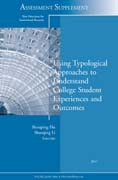
Using typological approaches to understand college student experiences and outcomes: new directions for institutional research, assessment supplement 2011
Hu, Shouping
Li, Shaoqing
INDICE: Editors’ NotesShouping Hu, Shaoqing Li1. Student Typologies in Higher EducationShouping Hu, Lindsey Katherine, George D. KuhThis chapter reviews various student typologies developed over time and the stability and change inAmerican college students’ characteristics, attitudes, and behaviors the typologies reflect.2. Students’ Involvement in Group Experiences and Connections to Leadership DevelopmentJohn P. DuganThis chapter introduces a taxonomy refl ecting patterns of involvement in student clubs and organizations during college and its relationship to leadership development. Insights for better understanding college student engagement, along with applications associated with institutional research, are explored.3. A Typology of Students’ Use of the Community CollegePeter Riley BahrThis chapter describes a typology of fi rst-time community college students based on students’ course-taking and enrollment behavior. The utility of the typology is demonstrated through an application that involves interpreting data concerning students’ participation in remedial mathematics.4. A Developmental Typology of Faculty-Student Interaction Outside the ClassroomBradley E. CoxThis chapter presents a typology of faculty-student interaction outside the classroom. As both a descriptive framework and a developmental model, the typology can be used independently or to augment traditional survey research. The chapter concludes with fi ve lessons learned about faculty-student interaction outside the classroom.5. The Use of Cluster Analysis in Typological Research on Community College StudentsPeter Riley Bahr, Rob Bielby,Emily HouseThis chapter provides an introduction to the family of partitionalcluster analytical methods, with specifi c attention to research on communitycollege students. Key decision points and common approaches in the use of cluster analysis are described.6. Typological Research on College Students for Better OutcomesShouping Hu, Shaoqing LiIn this chapter, we discuss the issues inconducting typological research and suggest the directions for future typological research on college students that could aid efforts to enrich student experiences and improve student outcomes.INDEX
- ISBN: 978-1-118-29611-0
- Editorial: John Wiley & Sons
- Encuadernacion: Rústica
- Fecha Publicación: 11/01/2012
- Nº Volúmenes: 1
- Idioma: Inglés
